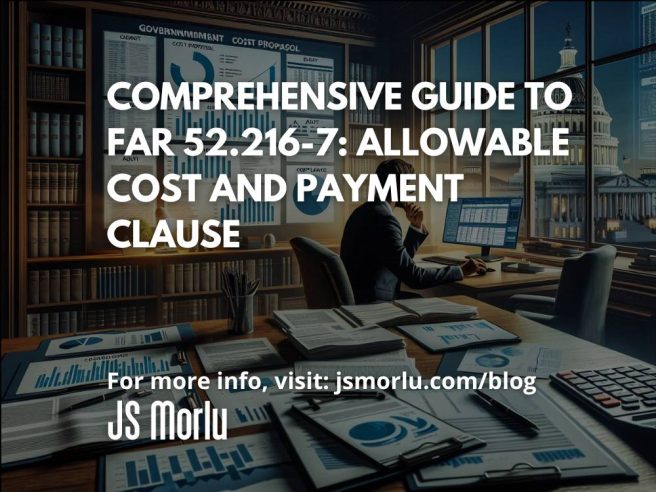By: John S. Morlu II, CPA
FAR 52.216-7, the Allowable Cost and Payment Clause, governs cost-reimbursement contracts with the U.S. Government. These contracts differ from fixed-price agreements by reimbursing contractors for incurred costs rather than providing a pre-set payment. FAR 52.216-7 establishes rules for determining which costs are reimbursable, how they are invoiced, and how final payments are made. For contractors, understanding and complying with this clause is critical to maintaining financial health, ensuring timely payments, and avoiding disputes.
This guide delves deeply into FAR 52.216-7, providing insights into its requirements, practical applications, industry best practices, and common challenges.
What is FAR 52.216-7?
FAR 52.216-7 applies to cost-reimbursement contracts, including:
- Cost-Plus-Fixed-Fee (CPFF) contracts: Contractors are reimbursed for allowable costs plus a fixed fee.
- Cost-Plus-Incentive-Fee (CPIF) contracts: Incentives are provided based on performance or cost savings.
- Cost-Plus-Award-Fee (CPAF) contracts: Award fees are based on meeting specific objectives.
The clause ensures contractors are reimbursed fairly while safeguarding government funds by disallowing unreasonable or unrelated costs.
Key Features of FAR 52.216-7
1. Reimbursement of Allowable Costs
Contractors are reimbursed for costs that meet specific criteria:
- Reasonable: The cost must align with what a prudent person would incur under similar circumstances.
- Allocable: Costs must directly benefit or relate to the contract’s performance.
- Allowable: Costs must comply with applicable laws, FAR Part 31, and contract terms. Certain costs, such as alcohol, lobbying expenses, and entertainment, are explicitly unallowable.
2. Provisional Payments
During contract performance, contractors submit interim invoices for provisional payments. These payments are subject to audits and adjustments to ensure compliance with cost principles.
3. Establishment of Final Indirect Cost Rates
FAR 52.216-7 requires contractors to establish final indirect cost rates (e.g., overhead, general and administrative costs) through a formal negotiation process. The steps include:
- Submission of an incurred cost proposal within six months after the fiscal year ends.
- Negotiation of final rates with the cognizant federal agency or the Defense Contract Audit Agency (DCAA).
- Adjustments to interim payments based on the negotiated rates.
4. Invoice Submission Requirements
Invoices must be detailed, accurate, and include:
- A breakdown of costs incurred (e.g., labor, materials, travel).
- Documentation supporting the costs claimed.
- Certification of the invoice’s accuracy and compliance with FAR requirements.
5. Contract Closeout
Final payments are made only after:
- Submission and audit of the incurred cost proposal.
- Agreement on final indirect cost rates.
- Resolution of any disallowed costs or outstanding issues.
- Submission of a final invoice.
Detailed Steps in FAR 52.216-7 Compliance
1. Preparation of Incurred Cost Proposals
Contractors must prepare and submit incurred cost proposals that detail direct and indirect costs. The ICE Model (Incurred Cost Electronically) is a common tool used by contractors to ensure their proposals meet DCAA audit standards.
Key sections of the incurred cost proposal include:
- Schedules of Direct Costs: Labor, materials, and other direct costs.
- Indirect Cost Rates: Overhead, fringe, and general and administrative expenses.
- Reconciliation Statements: Aligning claimed costs with general ledger data.
2. Negotiation of Final Indirect Rates
Once the proposal is submitted, the DCAA or another cognizant federal agency reviews it. The negotiation process involves:
- Verification of claimed costs through an incurred cost audit.
- Adjustment of indirect cost rates based on audit findings.
- Agreement on final indirect rates, which are applied retroactively.
3. Resolving Disputes
Disputes over disallowed costs or rate adjustments are common. Contractors may resolve these issues through:
- Direct negotiation with the contracting officer.
- Submission of revised documentation or justification.
- Use of the Disputes Clause (FAR 52.233-1) if necessary.
Challenges and Industry Best Practices
Challenges
1. Administrative Burden
Preparing incurred cost proposals, negotiating rates, and complying with audits can strain resources, particularly for small and medium-sized contractors.
2. Audit Risks
Contractors often face extensive audits, which can lead to disallowed costs or financial penalties if compliance is not meticulously maintained.
3. Delays in Final Payments
Delays in submitting incurred cost proposals or resolving disputes can result in delayed contract closeouts and final payments.
Best Practices
1. Invest in a Robust Accounting System
Implement systems capable of segregating allowable and unallowable costs, tracking indirect rates, and generating detailed reports. Software like Deltek Costpoint, Unanet, or customized accounting platforms can automate compliance tasks.
2. Prepare Early for Incurred Cost Proposals
Begin assembling data for incurred cost proposals during the fiscal year. Establish workflows to ensure accurate and timely submissions.
3. Maintain Transparent Records
Keep detailed records of all costs incurred and related documentation, such as receipts, timecards, and subcontracts. This transparency minimizes audit risks and streamlines compliance.
4. Engage with Auditors
Build collaborative relationships with DCAA auditors. Promptly address audit findings and proactively resolve potential issues.
5. Educate Your Team
Train accounting, finance, and project management teams on FAR 52.216-7 requirements to ensure everyone understands their role in maintaining compliance.
The Role of Technology in FAR 52.216-7 Compliance
Modern technology has revolutionized how contractors manage FAR 52.216-7 requirements. Key innovations include:
- Automated Cost Tracking: Real-time monitoring of direct and indirect costs reduces errors and ensures compliance.
- Pre-Built Compliance Templates: Platforms like the DCAA ICE Model streamline the preparation of incurred cost proposals.
- Advanced Reporting Tools: Tools for generating audit-ready reports simplify negotiations with federal agencies.
Common Missteps and How to Avoid Them
1. Missing Deadlines
Failure to submit incurred cost proposals within six months of the fiscal year end can lead to penalties and delayed payments.
Solution: Establish internal deadlines well before the official due date.
2. Claiming Unallowable Costs
Mistakenly claiming unallowable costs can lead to disputes or audits.
Solution: Train staff to identify allowable costs and regularly review FAR Part 31 updates.
3. Inaccurate Indirect Rates
Miscalculating overhead or administrative costs can lead to underpayment or repayment demands.
Solution: Conduct regular internal reviews and validate indirect cost calculations.
Conclusion
FAR 52.216-7 is a cornerstone of cost-reimbursement contracting, ensuring that contractors are fairly reimbursed while protecting taxpayer funds. Although compliance can be complex, adopting best practices, leveraging technology, and maintaining clear communication with auditors can significantly ease the process. Contractors who invest in strong accounting systems and a proactive compliance culture are better positioned to succeed in the competitive world of government contracting.
📖 Read next: Audit Nightmares: Real-World Lessons from Contractors Who Waited Too Long
Author: John S. Morlu II, CPA
John S. Morlu II, CPA, is the CEO and Chief Strategist of JS Morlu, a globally acclaimed public accounting and management consulting powerhouse. With his visionary leadership, JS Morlu has redefined industries, pioneering cutting-edge technologies across B2B, B2C, P2P, and B2G landscapes.
The firm’s groundbreaking innovations include:
• ReckSoft (www.ReckSoft.com): AI-driven reconciliation software revolutionizing financial accuracy and efficiency.
• FinovatePro (www.FinovatePro.com): Advanced cloud accounting solutions empowering businesses to thrive in the digital age.
• Fixaars (www.fixaars.com): A global handyman platform reshaping service delivery and setting new benchmarks in convenience and reliability.
Under his strategic vision, JS Morlu continues to set the gold standard for technological excellence, efficiency, and transformative solutions.
JS Morlu LLC is a top-tier accounting firm based in Woodbridge, Virginia, with a team of highly experienced and qualified CPAs and business advisors. We are dedicated to providing comprehensive accounting, tax, and business advisory services to clients throughout the Washington, D.C. Metro Area and the surrounding regions. With over a decade of experience, we have cultivated a deep understanding of our clients’ needs and aspirations. We recognize that our clients seek more than just value-added accounting services; they seek a trusted partner who can guide them towards achieving their business goals and personal financial well-being.
Talk to us || What our clients says about us




